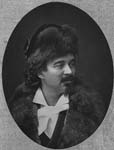Valery Jacobi

Valery Ivanovich Jacobi (Russian: Валерий Иванович Якоби or Якобий; 15 May [O.S. 3 May] 1834, Village Kudryakovo, Kazan Governorate, Russia - 13 May 1902, Nice, France) was a Russian painter and an older brother of Pavel Jacobi (1842–1913), a notable revolutionary and ethnographer.
Valery Jacobi was born to a family of an estate owner and started his education in the Kazan University, but broke his study to enlist in Russian Army (Siberian Volunteer Corps) during the Crimean War. In 1856 after retirement from the Army he decided to abandon his University study and pursue the artistic career instead.
In 1856-1861 he studied at the Imperial Academy of Arts, receiving a small gold medal for his painting Serene holiday of a beggar (1860). In 1861 he paints his probably the most notable painting Prisoners Stopping Place. In 1861-1869 Jacobi travels to Europe by an Academy grant, visiting Germany, Switzerland, France and Italy.
In 1870 Jacobi became one of the founding members of the Peredvizhniki art society. But in 1872 he was excluded for his failure to participate in a society exhibition and the general disagreement with the ideals of the society. Later he was considered a conservative, sceptical to the Peredvizhniki's ideas.
Jacobi was a member of the Imperial Academy of Arts since 1868, a professor since 1871, taught in the Academy in 1878-1889. He lived mostly in Saint-Petersburg creating historical paintings like Jesters at the Court of Anna Ioanovna (1872), Ice Palace (1878), etc. His works were criticized as purely decorative, lacking substance.
Jacobi died in Nice, France in 1902.
